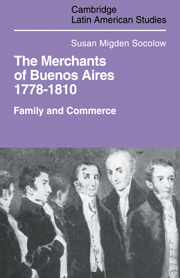Book contents
- Frontmatter
- Contents
- Dedication
- Acknowledgments
- Glossary
- Weights, measures and money
- Introduction
- 1 The merchant population
- 2 Women, marriage and kinship
- 3 Commerce and investment
- 4 Life style
- 5 Religious participation
- 6 Political and social awareness
- 7 Gaspar de Santa Coloma, merchant of Buenos Aires
- Conclusion
- Appendices
- Notes
- Bibliography
- Index
5 - Religious participation
Published online by Cambridge University Press: 04 August 2010
- Frontmatter
- Contents
- Dedication
- Acknowledgments
- Glossary
- Weights, measures and money
- Introduction
- 1 The merchant population
- 2 Women, marriage and kinship
- 3 Commerce and investment
- 4 Life style
- 5 Religious participation
- 6 Political and social awareness
- 7 Gaspar de Santa Coloma, merchant of Buenos Aires
- Conclusion
- Appendices
- Notes
- Bibliography
- Index
Summary
The interaction of the merchant group with the Church is especially significant in view of the overriding importance of the Church, and the religious nature of colonial society. This interaction was expressed at several levels: individual support of various churches or religious orders, leadership as directors and organizers of Church finances, and participation in religious associations.
The merchants of Buenos Aires were one of the most devout groups in colonial society. Religious participation provided them with greater social recognition, which benefited the individual, his family and the merchants as a whole. In return the merchants provided economic support for the Church, often financing church construction and expansion. An outstanding example of Church support was that of Juan de Lezica, who as a devotee of the Virgin of Luján, was the main sponsor of a new church in that town. Domingo Basavilbaso served for many years as the majordomo of the Cathedral of Buenos Aires, and in this capacity supervised the rebuilding of the church. His work was continued by his son, Manuel Basavilbaso, and then by Gaspar de Santa Coloma, a member of the Basavilbaso clan. These four men, wealthy and respected merchants, set examples of piety and generosity.
Special devotion to one or more saints was common among the merchants. Eugenio Lerdo de Tejada, for example, was a devotee of San Antonio de Padúa, and requested that he be buried at the foot of the saint's altar.
- Type
- Chapter
- Information
- Merchants of Buenos Aires 1778–1810Family and Commerce, pp. 90 - 106Publisher: Cambridge University PressPrint publication year: 1978



